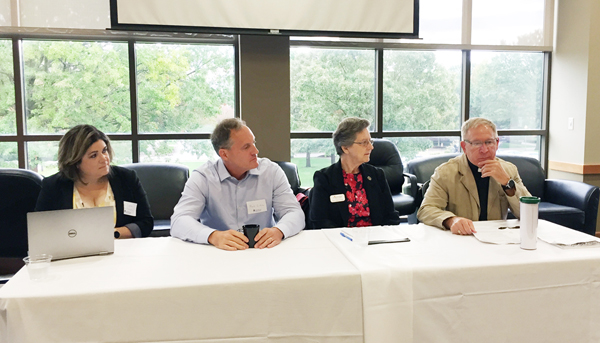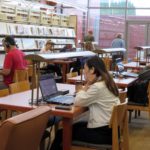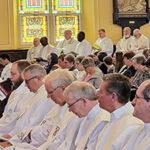
Panelists Maritza Espina, Mark Zinkula, Sister Johanna Rickl, CHM, and moderator Father Bud Grant listen as someone speaks during a dialogue on climate change at St. Ambrose University in Davenport Sept. 30.
By Barb Arland-Fye
The Catholic Messenger
DAVENPORT — A panel of faith and business leaders launched a dialogue in the Diocese of Davenport Sept. 30 on how to build common ground across different groups to address climate change.
“The Church promotes the principle of subsidiarity,” said Bishop Thomas Zinkula in opening remarks at St. Ambrose University in Davenport. “In other words, we shouldn’t simply turn over the issue of climate change to the national government and multinational corporations. They obviously have their role to play, but so do we at the local level.”
He and other event organizers, led by In Solidarity, a nonprofit amplifying the Catholic voice for justice, modeled the dialogue after one that took place in Rome this past summer. There, 70 executives from the oil and energy industry, and global investors, discussed “The Energy Transition and Care for Our Common Home.”
The dialogue in Davenport took place during the Season of Creation, which began Sept. 1 on World Day of Prayer for Creation and concludes Oct. 4 on the Feast of St. Francis of Assisi. The event also served as a springboard for the fifth anniversary of Pope Francis’ encyclical, “Laudato Si” and the 50th anniversary of Earth Day in 2020.
Bishop Zinkula said he hoped that the diocesan gathering — “this intersection of faith and business — this dialogue — will help our local businesses and communities think in new ways and work together to find sustainable energy solutions.”
St. Ambrose University Professor Father Bud Grant, the panel’s moderator, framed the dialogue on three key points:
• Recommit ourselves to authentic relationships with creation, the world’s marginalized and future generations.
• Recognize that creating and sustaining authentic relationships is part of a process of ever-deepening care and concern and not a problem to be fixed or a goal to be achieved.
• Healing ruptured relationships is costly, difficult and painful. “The earth and its most marginalized people are already suffering the most from ecological crises, though they are least responsible for those crises. As a matter of justice, that suffering ought to be shared more evenly, following a principle we might call redistributive suffering,” Fr. Grant said.
Many people are beginning to question the shareholder primacy model which has been in place for 40 to 50 years, said panelist Mark Zinkula. The brother of Bishop Zinkula, he recently retired as CEO of Legal & General Investment Management, one of Europe’s leading asset managers.
More investment firms are asking: Is it more appropriate to have a broader stakeholder model that includes not just shareholders but gives greater consideration to employees, customers, supply chain relationships and other key stakeholders? “There’s been a lot of momentum toward this perspective,” Mark Zinkula said. That model focuses on the long-term sustainability for the business and for the environment, he added.
From his own business experience, he has discovered that climate has become the most common topic among large, sophisticated investors. Investors increasingly realize that “protecting the planet and protecting their investments go hand in hand,” he said. Investors are allocating more money toward companies that are working to reduce emissions rather than those that do not.
Mark Zinkula also noted that surveys show that “the majority of millennials see the primary role of business is to improve society.”
Businesses are getting pressure from investors and from others to take steps to reduce carbon emissions. “There is a lot of positive momentum. The problem is, it is a race against time.” Addressing climate change requires a system-wide response — an international, collective approach. It will require an adjustment in lifestyles, he believes.
New research shows that companies paying attention to the environment as well as to making a profit are faring better than companies focused solely on profit, said panelist Maritza Espina, dean of the College of Business at St. Ambrose University. She also serves as the executive director of the Sustainability, Ethics & Entrepreneurship Society and is described as a leading thinker on business ethics and impact investment.
That doesn’t mean, however, that the needle is moving quickly enough in the right direction, she said. A large group of businesses have not embraced this change. Some companies that reinvent themselves actually come up with a better business model, she said. She gave the example of a carpet tile business whose CEO was upset to learn that his company was considered one of the worst polluters. Over a decade, he implemented change that was better for the environment and ultimately saved his company.
She cited the Green Business Council as a successful, collaborative effort by the construction industry to incorporate practices that are better for the environment, including the use of more sustainable building materials. This is an example of industries coming together and adding value to each firm, she said.
Espina believes that religion plays an important role in helping society, business and government to address climate change. Time is of the essence. “We basically have a decade to act,” she said. “We’re not moving fast enough.”
Speaking specifically about academia, she said, “Our role is to shape and form future business leaders. We’re finding models that will eventually translate into textbooks and cases that our students will be able to use. We’re not there yet,” she said.
“What we’re doing in the classroom here at St. Ambrose University, we embrace the ‘business for the greater good’ concept. And we’re trying to make it part of our students’ experience. They need to consider the environment and the society when they make business decisions. The challenge remains: “how you create business models that that will grow but with a responsible mindset.”
Panelist Sister Johanna Rickl, CHM, focused on the relationship aspect of care of God’s creation. She serves as vice president of the Congregation of the Humility of Mary. “We all need to experience ourselves in a much broader context if we are to achieve some common understandings that will help us address a threat to the whole planet,” she said. “The fact that we do not exist in isolation but rather in relationship to all life on Earth provides a basis for affirming our moral responsibility to respect the dignity and rights of all.”
She shared a personal example. “If someone sets a fire, all who live nearby must deal with the smoke and ash. And if it is a big enough fire, as I found out during my vacation in Montana, even those far away from the fire may experience burning eyes and difficulty breathing. There is no distinction according to gender, race or nationality. We all suffer the consequences.”
Conversely, addressing a threat to the climate helps other situations. “Our congregation recently completed a conservation easement on part of the land near our retreat center (Our Lady of the Prairie in Wheatland). That action may improve the health of the Wapsipinicon River that flows along one edge of the easement. It should help create better habitat for many plants and animals. The prairie grasses and flowers offer good opportunities for bees, butterflies and other insects to do the important work in human food production.” Other benefits include more effective retreats and contemplative experiences for people seeking to nourish their relationship with God, others and nature, she said.
Solar panels have been installed at both Our Lady of the Prairie Retreat and at the Clinton Franciscans’ home in Clinton, producing energy that doesn’t add carbon to the atmosphere, Sr. Rickl said. Advocacy is another important element in addressing climate change. “We try to influence policy and governance so that the common good is advanced in all areas,” she said. “Justice for the human family and care of Earth go hand in hand.”











